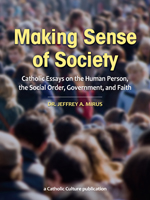
By Dr. Jeff Mirus June 03, 2013 5:14 PM

From Our Store: Making Sense of Society (eBook)

The appointment of Peter French Ryan, SJ to the key doctrinal post for the US Conference of Catholic Bishops is very interesting indeed. Fr. Ryan, who once served on the Board of Directors of the Cardinal Newman Society, is a high-profile advocate not only of doctrinal fidelity but of a strong Catholic identity in Catholic higher education—at a time when Jesuit universities and colleges are among the least faithful. He has just been namedExecutive Director of the Secretariat of Doctrine and Canonical Affairs at the USCCB.
So now we have the very highest position in the Church occupied by a Jesuit (Pope Francis) and also the highest full-time doctrinal position in the United States. I wonder if there is a connection.
The Society of Jesus is a particularly tough organization to reform. The traditional prestige and academic eminence that many Jesuits enjoy, along with the worldly favor shown to precisely those who betray the teachings of the Church, tends to make them impervious to effective criticism and reluctant to change from within. Successive Superiors General of the Society since the mid-20th century have done surprisingly little to foster renewal despite consistent encouragement by every pope to do exactly that.
One remembers, for example, that Pope John Paul II told the Jesuits in 1979 that their order was causing confusion among the faithful. When the notoriously liberal Superior General Fr. Pedro Arrupe suffered a stroke in 1981, the Jesuits chose an American Modernist, Fr. Vincent O’Keefe, to run the order until a new Superior General could be chosen. But Pope John Paul II intervened by appointing the top-ranking Jesuit in the Church, Cardinal Paolo Dezza, to try to guide the Order to elect a sound Superior General. In some ways, this choice showed the length and depth of the problem. Cardinal Dezza had helped Pope Pius XII with the proclamation of the Assumption of Mary way back in 1950. By 1981, he was already eighty years old.
Little came of this, as the Order elected the Dutch academic Peter Hans Kolvenbach as its new Superior General. In 2008, however, another opportunity emerged, as Fr. Kolvenbach decided to resign. I noted in one of my commentaries that both the Prefect of the Congregation for Religious and Pope Benedict himself were strongly insistent that the Jesuits take advantage of this opportunity to set the Order on a new course of fidelity to the Church, remembering their fourth vow of special obedience to the Holy Father (see Emphasizing theBlack in “Black Pope”). Once again, however, mere exhortation proved insufficient to create much change under the new Superior General, Fr. Adolfo Nicolas—who had long since proven himself incapable of expressing Catholic teaching clearly and unambiguously.
In the wake of the abuse scandal, when the Vatican reiterated in no uncertain terms that men with same-sex attraction were not to be admitted to the priesthood, the Jesuits were among the loudest in denunciation and resistance. This surprised nobody, as anecdotal evidence of intense sympathy for the gay lifestyle, and even the protection of pedophiles among their own members, was already the stuff of legend. Now the Order has begun to pay out immense funds, for such a small group of men, to settle claims of sexual abuse. Few doubt that this is the tip of a very large iceberg.
Nonetheless, one of the greatest scandals is that the Jesuits still tend to set the tone for Catholic higher education in many parts of the world. For this reason, their influence among Catholic intellectuals, social leaders and politicians is far more pervasive than it should be, and the formation received at a good many wayward Jesuit schools enables such leaders to claim to be fully Catholic while actually denying the Faith. For this reason, I have long been an advocate of suppressing and then reconstituting the Order with those members who are willing to make a public commitment to the founding charism, including absolute obedience to the Pope.
But there may now be another way.
We must remember that there are still Jesuits, including a few youngish recruits, who have remained uninfected by the related diseases of secularism and Modernism. Up to now they have been held in severe check. Because corrupt superiors in a religious order can make things very difficult for members who wish to be faithful to the Church (as Pope Francis himself has experienced), and because this state of affairs invariably discourages deeply committed and orthodox young men from entering the order, renewal from the top down becomes very important.
In other words, somebody somehow has to open up avenues of preferment to those who are sound—by which I mean not only intelligent but doctrinally and morally faithful to Christ. The leadership of the Society has been notoriously difficult to penetrate, but when—ecclesiastically speaking—the highest and most influential Jesuits are demonstrably outside the Order’s internal governing structure, interesting opportunities may well emerge.
I am not yet making fresh predictions. But the key question is this: How can the Church bring herself to the point at which she can effectively guide the Jesuits once again? That is why the election of Pope Francis, and even the appointment of Fr. Ryan, are so interesting. We should watch for similar moves elsewhere, and take careful note of what happens over the next few years. The renewal of the Jesuits, for obvious reasons, is of the highest importance for the renewal of the Church.
James Profit, SJ
Saju George, SJ
Donal Godfrey, SJ
London's "Soho Mass"
Robert VerEecke, SJ





No comments:
Post a Comment